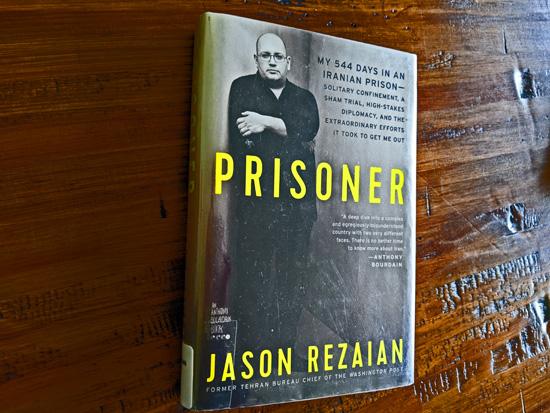I’ve spent a lot of my professional life during the past six or seven years with a responsibility for keeping an eye on what is going on day-to-day in a few regions of the world, including the Middle East. That has meant sometimes a hyper focus on things like the Iran nuclear deal negotiations and tangentially related things such as the arrest and prolonged, unjustified detention of Washington Post Tehran Bureau Chief Jason Rezaian.
But I knew about that from the outside. I read the statements given by his family and by Post executives. I saw various legal updates from Iranian officials. I saw the massive outpouring of support from the journalism community and those who agree that doing our jobs is not a crime.
Reading “Prisoner” was an amazing look at what I couldn’t see, what was happening inside the prison itself from Rezaian’s point of view, as well as a very informative primer on Iranian history and politics, U.S.-Iran relations, and the experiences of people who have a foot in both countries. It’s the type of story that Rezaian explains made him a perfect choice for the Post when the newspaper wanted to hire someone to explain Iran to its readers.
This is a book I absolutely recommend to anyone, whether you’ve heard a lot or a little about his case or if you know a lot or a little about Iran. You’ll learn a ton and have fun along the way. One thing Rezaian says helped through his detention and frequent pointless questioning was his sense of humor, and that really comes through in this text.
He’ll also make you appreciate your team, the people who whether you know it or not at this very moment would set aside much of their lives in an instant to go to bat for you. I remember seeing this image upon his release and thought about it often when I was reading:
I connected now in a way I would not have four years ago with the relationship between Rezaian and his wife, Yegi, who were arrested together at a time when they were still enjoying the lives of newlyweds. Not only has my frame of reference changed with the basic fact that I’m now married (that photo above was taken a month after my wife and I started dating), but this piece of post-prison life Rezaian shares from around the time of their third anniversary when, as he notes, they had finally spent more time together as a couple than they had been separated by the walls of the Iranian prison:
“We spent our anniversary as we did so many other days during the first months of our marriage: filling out forms. Although we had completed the entire immigration process for Yegi to become a U.S. permanent resident before we were arrested, we had to start from scratch when we arrived. All of those completed and approved applications had expired.”
Having navigated this process, I can’t even imagine the double punch in the gut that must have been to get out of prison after such a nightmare and then find out you had to restart what is a loooooooong and document-filled process that at times makes you wonder what else you could possibly disclose about yourself and your relationship.
One nugget I flagged that I found so interesting because I had never heard about it before came when Rezaian talked about the 1979 Iranian hostage crisis, and how that changed things for Iranians living in the United States like his dad, a popular rug salesman.
“Hundreds of American business owners offered gifts to the returning hostages. There were free steaks for a year from Nebraska, trips to Hawaii from the Aloha State’s tourism board. Major League Baseball presented each returnee with a golden ticket that provided entrance for the hostages (and a guest) to every regular-season baseball game for the rest of their lives. And my dad offered each one of them a rug.”
Now, I didn’t doubt Rezaian when I read this, but I did flag it as something I had to research later. I’ve heard of these cards, given to various people as a gift, including former players. But I had no idea they were part of the welcome home packet for the hostages.
I flew through this book and am happy to report I’m at or ahead of my goal for the year. This was my sixth read, something I didn’t accomplish last year until early September. Yes, September! The caveat is that last year I read two Spanish books early in the year, and I’m much slower at that. My goal is to read at least three this year, so at some point I’ll slow down, but as of right now I’m feeling excellent about my reading year.
